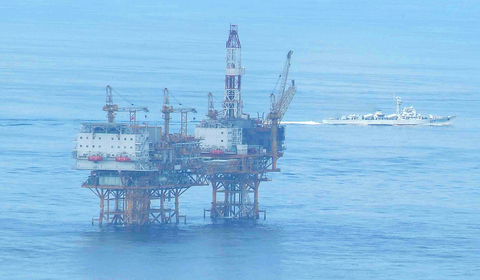Japan's navy said yesterday it was keeping a close eye on Chinese military moves after five warships were spotted near disputed gas fields and the reported incursion of a spy plane.
Japan said Friday it saw Chinese warships, including a destroyer, for the first time near the gas field in the East China Sea amid high tensions between the two countries.
"We are aware of most of their [China's] activities and we will do our utmost to monitor the situation," said Admiral Takashi Saito, the chief of staff of Japan's Maritime Self Defense Force.

PHOTO: AP
The ships were seen just on China's side of what Japan considers the dividing line in the sea. China does not recognize the line.
Meanwhile, Kyodo News, citing unnamed sources in a dispatch from Washington, said a Chinese spy plane was spotted twice last month over the East China Sea south of mainland Japan's southern island of Kyushu.
The plane was flying in Japanese airspace and could likely catch radio waves and electronic data from Japanese warships or military facilities, it said. The aircraft seemed to be carrying out an exercise or test in Japan's designated air defense zone, Kyodo quoted an unidentified source as saying.
China has never confirmed the existence of such a plane but the US Defense Department believes Beijing is focusing on "electronic warfare" as it expands its military spending, the report said.
Japan's Defense Agency is aware of the spy plane report but had no immediate comment, a spokesman said.
Kyodo said this was the first time a Chinese electronic surveillance aircraft had been spotted, and quoted its sources as saying the plane's purpose was identified by its external features and flight pattern.
Both Japan and the US have recently expressed concern about China's growing military spending.
Meanwhile, the Japanese government announced yesterday that it hopes to reach an agreement with the US next month on a realignment of US forces in the country.

Right-wing political scientist Laura Fernandez on Sunday won Costa Rica’s presidential election by a landslide, after promising to crack down on rising violence linked to the cocaine trade. Fernandez’s nearest rival, economist Alvaro Ramos, conceded defeat as results showed the ruling party far exceeding the threshold of 40 percent needed to avoid a runoff. With 94 percent of polling stations counted, the political heir of outgoing Costa Rican President Rodrigo Chaves had captured 48.3 percent of the vote compared with Ramos’ 33.4 percent, the Supreme Electoral Tribunal said. As soon as the first results were announced, members of Fernandez’s Sovereign People’s Party

MORE RESPONSIBILITY: Draftees would be expected to fight alongside professional soldiers, likely requiring the transformation of some training brigades into combat units The armed forces are to start incorporating new conscripts into combined arms brigades this year to enhance combat readiness, the Executive Yuan’s latest policy report said. The new policy would affect Taiwanese men entering the military for their compulsory service, which was extended to one year under reforms by then-president Tsai Ing-wen (蔡英文) in 2022. The conscripts would be trained to operate machine guns, uncrewed aerial vehicles, anti-tank guided missile launchers and Stinger air defense systems, the report said, adding that the basic training would be lengthened to eight weeks. After basic training, conscripts would be sorted into infantry battalions that would take

GROWING AMBITIONS: The scale and tempo of the operations show that the Strait has become the core theater for China to expand its security interests, the report said Chinese military aircraft incursions around Taiwan have surged nearly 15-fold over the past five years, according to a report released yesterday by the Democratic Progressive Party’s (DPP) Department of China Affairs. Sorties in the Taiwan Strait were previously irregular, totaling 380 in 2020, but have since evolved into routine operations, the report showed. “This demonstrates that the Taiwan Strait has become both the starting point and testing ground for Beijing’s expansionist ambitions,” it said. Driven by military expansionism, China is systematically pursuing actions aimed at altering the regional “status quo,” the department said, adding that Taiwan represents the most critical link in China’s

EMERGING FIELDS: The Chinese president said that the two countries would explore cooperation in green technology, the digital economy and artificial intelligence Chinese President Xi Jinping (習近平) yesterday called for an “equal and orderly multipolar world” in the face of “unilateral bullying,” in an apparent jab at the US. Xi was speaking during talks in Beijing with Uruguayan President Yamandu Orsi, the first South American leader to visit China since US special forces captured then-Venezuelan president Nicolas Maduro last month — an operation that Beijing condemned as a violation of sovereignty. Orsi follows a slew of leaders to have visited China seeking to boost ties with the world’s second-largest economy to hedge against US President Donald Trump’s increasingly unpredictable administration. “The international situation is fraught